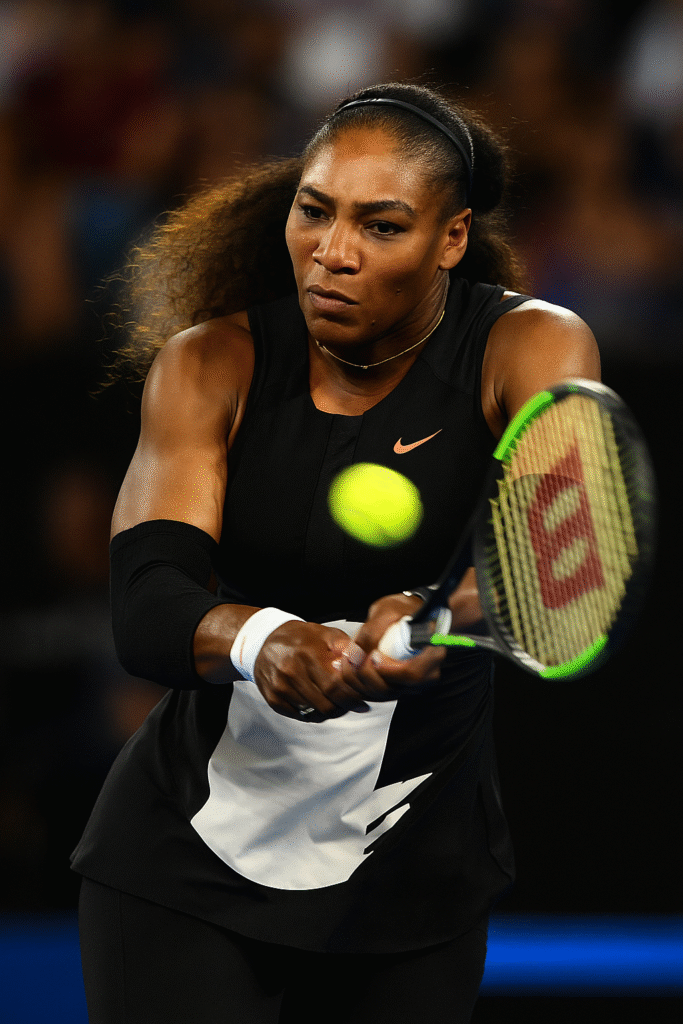Serena Williams is celebrated as one of women’s sports legends, known for her unmatched power on the tennis court and her bold, stylish personality. In a career spanning 25 years she amassed 23 Grand Slam singles titles – the most in the Open Erawtatennis.com. (A Grand Slam is a major tennis tournament – the Australian Open, French Open, Wimbledon, or US Open.) Her 23 Grand Slams set a Serena Williams Grand Slam record for singles titles. Serena’s influence goes beyond wins: she’s a tennis fashion icon who treated each match like a runwaybbc.com. In this article we look at her Grand Slam triumphs, signature style and rivalries, the challenges she overcame (from injuries and bias to motherhood), and her many off-court contributions.
Grand Slam Wins
Serena Williams Grand Slam tally is staggering: 23 singles titles, only one shy of Margaret Court’s all-time 24 but far ahead in the modern erawtatennis.com. In tennis these “majors” are the sport’s biggest events. Serena won across all four courts – hard, clay and grass – proving her versatility. In fact, she even held all four titles at once in 2002–03 (“The Serena Slam”).

Serena Williams Grand Slams by year:
| Year | Grand Slam Title(s) |
| 1999 | US Open |
| 2002 | French Open, Wimbledon, US Open |
| 2003 | Australian Open, Wimbledon |
| 2005 | Australian Open |
| 2007 | Australian Open |
| 2008 | US Open |
| 2009 | Australian Open, Wimbledon |
| 2010 | Australian Open, Wimbledon |
| 2012 | Wimbledon, US Open |
| 2013 | French Open, US Open |
| 2014 | US Open |
| 2015 | Australian Open, French Open, Wimbledon |
| 2016 | Wimbledon |
| 2017 | Australian Open |
Each title is a story of power and grace. Her first Grand Slam came as a 17-year-old at the 1999 US Open, defeating Martina Hingis. She swept three in a row in 2002 (including beating sister Venus in each final)womenshistory.org. Her final Grand Slam win was the 2017 Australian Open – while secretly pregnant – when she beat Venus yet againpeople.com. Every win helped redefine tennis history – her 23 wins remain an Open-era recordwtatennis.com.
You can also read about Tennis
Style and Influence
Serena Williams style is as famous as her serves. On court she made fashion statements that inspired fans worldwide. “I explored fashion and style as a way to distinguish myself,” she said, noting that “the tennis courts became my runway”bbc.com. From bright catsuits to flowing dresses, she blended athleticism and flair. For example, at the 2018 French Open she wore a daring “Wakanda-inspired” black catsuit (later banned for dress code), proudly explaining it was a health precaution after childbirthsltrib.com. That incident drew support from figures like Billie Jean King, who said “the policing of women’s bodies must end,” highlighting Serena’s impact on women’s athletic fashion.
Each outfit told a story. Serena Williams once explained: “Ever since I was a little girl, I’ve used fashion as an outlet to express myself — fashion gave me the confidence to step on the court and own who I was”m.economictimes.com. She launched her own clothing line (S by Serena) and even earned the CFDA Fashion Icon Award. In 2023 she became the first athlete honored as a fashion iconbbc.com, rubbing shoulders with Beyoncé and Rihanna on the red carpet. In tennis media Serena is often called a tennis fashion icon, respected for creativity and confidence in every ensemble.
Serena Williams influence extends to the next generation. Many young players cite her as inspiration for powerful play and self-expression. Even rivals acknowledge her impact. Maria Sharapova – one of Serena’s longest-standing opponents – wrote in her memoir that “Serena Williams has marked the heights and the limits of my career — our stories are intertwined”vox.com. In other words, Serena set the benchmark. Their rivalry (Serena leading their head-to-head by 18–2) drew huge crowds and global attention, cementing Serena’s cultural footprint. Off-court, Serena has used her platform to break barriers: she has been an outspoken advocate for gender and racial equality in sports, inspiring stories in media and beyond.
Challenges Faced

Serena’s path wasn’t always smooth. She battled serious injuries – knee surgeries, foot stress fractures, and more – that sidelined her at times. In 2003 she had knee surgery, and a few years later endured losses that dropped her ranking to No. 139. She courageously fought back each time to regain her form.
Being Black and a woman in a mostly white sport brought extra hurdles. Serena noted early on: “As a Black tennis player, I looked different. I sounded different. I dressed differently… But when I stepped onto the court, I could compete with anyone.”revolt.tv. Despite her record, she’s faced racial and sexist remarks. She once wrote that she was “disrespected by my male colleagues” and was “subject of racist remarks on and off the tennis court”theguardian.com. Famous incidents, like 2018’s U.S. Open final (when she loudly confronted an umpire), sparked debate on double standards in sports. Throughout it all, Serena kept her dignity, often reminding fans why she’s a role model.
Motherhood added another layer. In 2017 Serena won the Australian Open while about two months pregnant – a feat unheard of in tennis. Tragically, childbirth nearly cost her life. She later revealed, “I almost died after giving birth to my daughter, Olympia. Yet I consider myself fortunate.”theguardian.com Her C-section led to a pulmonary embolism and a ruptured incision, underscoring how dangerous childbirth can be, especially for Black women in the U.S. Serena turned her crisis into a cause: she became a vocal advocate for maternal health, using her experience to highlight disparities. In interviews she candidly spoke about the struggle to balance family and career, saying “I never wanted to have to choose between tennis and a family. I don’t think it’s fair”people.com. Her honesty inspired countless women juggling work and motherhood, showing yet again the depth of her influence beyond sport.
You can also read about Women In Sports
Off-Court Contributions
Serena’s impact far exceeds tennis. She’s a shrewd businesswoman and philanthropist. In 2020 she launched Serena Ventures, a venture capital firm investing in startups with diverse leadershipunicef.org. (She’s backed companies in sports, tech, and fashion, including some unicorns.) Serena also owns businesses: she had a minority stake in the Miami Dolphins football team and in the WNBA’s Angel City FC, and recently co-founded the fashion brand Aneres. Her business acumen is part of what makes her a true icon of women’s sports and entrepreneurship.
Serena Williams uses her wealth and fame to give back. She co-founded the Serena Williams Fund, which awards college scholarships to students affected by violence or from low-income backgroundsbeyondtheboroughs.org. As a UNICEF Goodwill Ambassador since 2011, she champions children’s education and health in Africa and beyondunicef.org. For example, she helped boost funding for schools through the Schools for Africa campaign. In 2018 she wrote a CNN op-ed about maternal mortality (after her own scare), raising awareness of healthcare gaps for mothers. Her philanthropy reflects her values: she often says the struggles she’s endured make her empathetic to others.
In summary, Serena’s off-court legacy is as vast as her on-court one. She’s a women’s sports legend who has parlayed her fame into fashion, business and charity. “Serena Williams is one of the greatest tennis players of all time,” notes UNICEFunicef.org, and adds that her combined sports, fashion, philanthropy and business success make her “one of the most recognizable icons in the world and a powerful voice for women”unicef.org. Indeed, from her 23 Grand Slam crowns to her fearless advocacy, Serena Williams embodies power, grace and dominance in every arena she enters.
Off-court highlights:
- Serena Ventures: Founded in 2020, invests in women- and minority-led startupsunicef.org.
- Fashion Entrepreneurship: Creator of activewear brand S by Serena; first athlete to win CFDA Fashion Icon.
- Philanthropy: Serena Williams Fund for scholarships (beyond schools)beyondtheboroughs.org; UNICEF ambassador promoting children’s education and maternal healthunicef.orgtheguardian.com.
- Advocacy: Champion for gender pay equity and Black women’s health, using her story to spark changetheguardian.comtheguardian.com.
Each of these roles underscores her multifaceted influence. As Serena herself said about style and self-expression, she’s always been “courageous” and intended to “raise each other up”revolt.tv. In sport and society, Serena Williams stands as a testament to resilience and empowerment – a true icon who changed the game both on and off the court.
Sources: Serena Williams’s career and quotes are documented in outlets like the official WTAwtatennis.com, People Magazinem.economictimes.compeople.com, BBC Newsbbc.com, The Guardiantheguardian.com, UNICEFunicef.orgunicef.org, Pexels (images), and various sports history archivestheguardian.combeyondtheboroughs.org.
